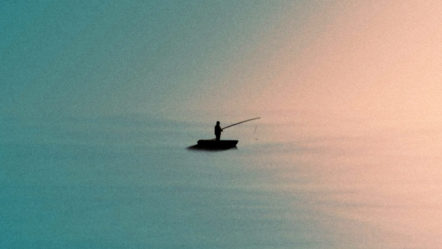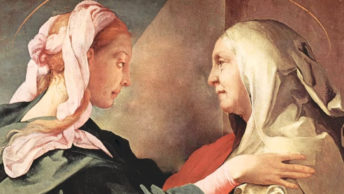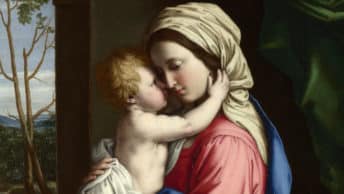I used to have a treadmill but I eventually sold it for lack of use. I never really enjoyed using it. I would rather take a good nature walk in the fresh air. However, I think the treadmill is a perfect metaphor of something more significant. So many people are stuck on the treadmill of life. Their endless cycle of work, carpools, ball games, shopping, lack of sleep and an endless list that seem to grow daily saps the energy of both the body and soul.
All this activity is acerbated by a variety of fears and external threats, such as terrorism, inflation, taxes, uncontrollable immigration and scores of homeless people crowding our city streets. This is not to mention the doomsday predictions of hordes of climate experts.
Millions of people have become like the wanderer who seeks out a Buddhist monk on a mountain top in Tibet or a shaman in Korea. They all want to know the meaning of their lives. Even the denizens of the poorest shanties and the haunts of the homeless, wonder whether their lives have any meaning at all. Many others have sought their solace in pills, liquor and anything that will give them a momentary high that will make their pains disappear for a short while.
All this is done to avoid facing the questions: why was I born and what happens when my life is over? As a second grader at Our Lady Queen of Martyrs, the third question of the Baltimore Catechism purported to give us the answer to these questions. God made us to know, love and serve Him in this world and be happy with Him in the next. Cynics have called this Pie in the sky. Yet many of these same people long for a paradise on earth, where Capitalism, the Catholic Church and all oppressive political leaders have been eliminated. They believe when this occurs there will be eternal peace on earth and the world will have been purified. I call this their Cake by the lake.
This reminds me of a short story of the same name we read in high school. It depicted an earth that was ravaged by wars, famine, pestilence and terrible extremes in climate that left only two people on this earth. The final two inhabitants of our planet were a woman with red hair and freckles and a man without them. Instead of becoming the new Adam and Eve, he hit her in the head with an ax and then promptly died of the poison she had put in his tea. Then as the animals roamed the earth, uninhabited by people, it became a perfectly good place for them to live. This underscores the truth that there can never be a paradise on earth because man’s unbridled human nature is so flawed that it is irrational to think that Peace on Earth can ever reign here before the Second Coming.
In the meantime, we can try to learn something from Socrates, who said that only the examination of one’s life makes it worth living. Scholars spend an entire lifetime trying to understand the near unfathomable mysteries of life. Bishop Fulton J. Sheen had one of the most popular TV shows in the fifties called Life is Worth Living. He used modern technology to preach the word of God in a manner few others were qualified to do. Attaining a Peace of Soul by getting right with God was the essence of his life-long message.
Others, especially in Hollywood, apparently had little or no interest in the saintly bishop and his teachings on the MOL. Films, such as Monty Python’s The Meaning of Life and Terrance Malick’s The Tree of Life are representative of this group. Monty Python’s 1983 film was a farce that really was not designed to answer any real questions. It opens with the Python team’s faces super-imposed on the animated bodies of fish, swimming aimlessly in a tank in a restaurant. This is his obvious reference to the world’s alleged Darwinian beginnings. As one of their number is being prepared as an entrée for a dinner, the survivors engage in a silly philosophical discussion on the meaning of life in a fish tank.
The film painfully trudges along the Seven Stages of Life. To put it simply, men and women are born, fight wars, get married, have sex, get fat and old and die. It takes a tasteless look at the Catholic Church’s view on masturbation and contraception. It is replete with the crude phrase that every sperm is sacred. Their Meaning of Life is no threat to the Church nor William Shakespeare. There is no coherent philosophy since it was clear that their writers were in it just for the laughs. The only conclusion is that Monty Python’s team believes there is no meaning to life or that life is just one big joke that some unseen power has forced on the world.
Malick’s 2011 film The Tree of Life takes the MOL to a different, even less intelligible level.The Tree of Life has been a near universal symbol that may have had its origins in Central Asia. From there it was absorbed by many different cultures. Many believe it revolves around the infamous Tree of Knowledge of Good and Evil in the Garden of Eden. From that comes the idea that the Book of Genesis connected Heaven to the underworld. Many others believe that this tree is the Tao or the Way of man’s eternal life. It returns in the Book of Revelation, the last Book in the Bible, as part of the new garden of paradise. Some scripture scholars hold that access is no longer reserved just for those who keep God’s commandments because all have a right to the Tree of Life.
The Church has a lengthy and consistent view on the TOL. Pope Benedict said that the Cross is the true Tree of Life. Saint Bonaventure taught that the medicinal fruit of the Tree of Life is Christ Himself. St. Albert the Great extended this to mean that the Eucharist is the true TOL because it is the Body and Blood of Christ. St. Augustine also believed that Jesus represented the real Tree of Life.
One will find none of this in Malick’s film. Starring Sean Penn, Brad Pitt and Jessica Chastain, Malick’s film chronicles his version of the origins and meaning of life. He does this through a series of flashbacks of Penn’s character Jack whose memories of his family in Texas in the 1950s bring some sort of undefinable meaning. This is tediously interspersed with the imagery of the primitive origins of the universe and the beginnings of life on earth. As the film progresses, it quickly turns into an unintelligible journey of cluttered philosophies and emotions that push the TOL into a universe of chaos, devoid of sense or meaning. I took this twist to imply that the hand of Darwin was more visible than that of an Almighty and all-loving Creator.
Chastain provides the one notable hint of the Divine in the film. As Mrs. O’Brien, Pitt’s wife, she recalled a lesson that had been taught to her as a child that people must follow either the path of grace or the path of nature. At the end of the film, Malick reveals his quasi-theology as a wavering light that continues into the darkness, which has served as a mysterious presence whose meaning seems unreachable for the human mind. Personally, I think Malick is playing in a theological arena without any sort of understanding or faith. Like so many armchair theologians, he appears clueless at what the real meaning of life is. Or perhaps his understanding is that like the Pythons, he believes there is no intelligible meaning to life.
This interpretation contradicts the thinking of Bishop Sheen, who taught that the human heart, not the ones you see on St. Valentine’s Day, seems to have a piece missing at its top. This is metaphorically the hole in the heart that has made billions of human beings feel that something has been drastically absent from their lives.
That empty feeling is what psychotherapist, Viktor Frankl, called mankind’s existential vacuum. In his book, Man’s Search For Meaning, he noted that people look in all the wrong places. Their plight reminds me of the story of the man who had lost his watch on a dark street. He was seen looking under the bright illumination of a street light. When someone offered to help him, he first asked the man where he thought he may had dropped it. The man pointed to a place 20 feet away from where he was searching. When asked why he wasn’t looking in that place, his answer was The light is much better here.
Literature, history and psychology abound with the pathos and sadness of the human condition. This is the dreadful box our first parents opened in Eden. All human hearts are hungry for the life Jesus has promised all those who follow him. Many take the convenient or enlightened way out and start their search in things easily obtained, like wealth, sex, power and many other purely human activities that provide some psychological boost to their sagging spirits. Old men often trade their wives in, like an old car for a new, sexier model. These are never enough to satisfy their inner yearnings or missing piece. There is always the next million, prettier girl or bigger house.
This also explains why so many have turned to alcohol, drugs and pornography. Their bodies and alas their souls are addicted to artificial ways to deaden their moral pain. Their next self-injected high can lead to death. Perhaps that is the result they truly desired. At the end of their lives, it is as if none of these fleeting pleasures and moments of satisfaction had lasted long enough to satisfy their needs.
Some human pleasures are very good for us but only when we seek them from the path of Grace, as Chastain’s character pointed out. I have often said that at my age, my body gives me much more pain than pleasure. So I have looked for good ways to tune my body and its needs into things that were good for me, such as Yoga and a regular massage. The momentary highs of a good meal, a jog in the park or a nature walk are also good for us.
These pleasures often induce a natural high, not unlike what the late singer John Denver, called a Rocky Mountain High or that sense of exhilaration that comes from experiencing the scenic beauties of God’s nature. I have often seen the face of God in a little child’s bright smile. While these physical highs can transcend one’s body and create a warm sense of the Holy Spirit entering our souls, they are no more than a temporary hint of what God has in store for us. We should never make them the end and be all of our earthly lives.
There can never be heaven on earth. It is but a dim reflection of what the Father has prepared for us in Heaven. The truth is that we can only fill our emptiness in the love of Jesus Christ. This is deeply rooted, I believe, in St. John Paul II’s Theology of the Body. All of the above can present us with a foretaste of Heaven. I believe that is what they were designed to provide. St. Augustine knew all about special highs. That is why he wrote, that are hearts are restless until they rest in you. Life can be likened to eating at a Chinese restaurant. We are hungry three-hours after we have finished enjoying the wonders of life. Only when we realize that the Best is yet to come, can we quell the insatiable appetite of our hungry hearts.








